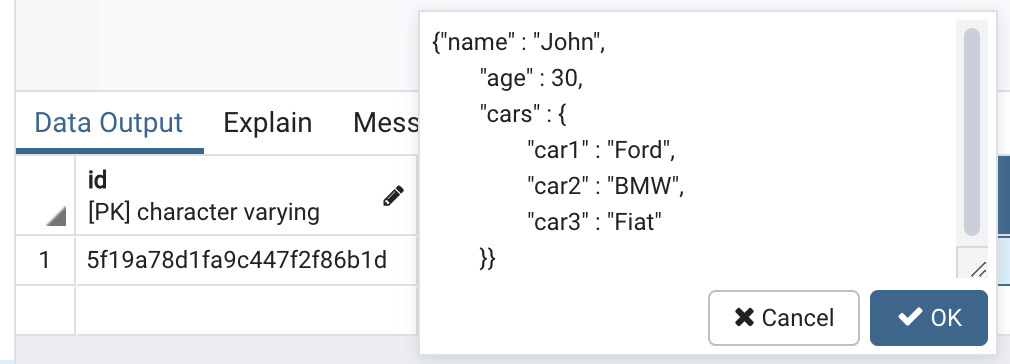


Having columns for every possible attribute for a product can at times very much be overkill. In certain categories such as books you’d have things like whether it’s fiction or not but in others such as clothes you might have things like size, and color. In the most basic case attributes of a product catalog can be a great candidate. If you have relational data as well as some data that may not always exist on a column: it can be a great fit.
#RAILS POSTGRES JSON QUERY FULL#
This way when you filter on something it’ll use the index if it makes sense to the planner within Postgres.Īs hstore isn’t a full document equivalent, it’s a stretch to consider using it as such.
In particular, a GIN or GiST index will index every key and value within the hstore. The obvious benefit here is flexibility, but where it really shines is being able to leverage various index types. INSERT INTO products ( name, attributes ) VALUES ( 'Geek Love: A Novel', 'author => "Katherine Dunn",Ĭategory => fiction' ) SELECT name, attributes -> 'author' as author FROM products WHERE attributes -> 'category' = 'fiction' You can simply insert the record and it’ll save everything. The upside of hstore is you don’t have to define any of your keys ahead of time. You also don’t get any nesting in short it’s a flat key/value datatype. With hstore you’re a little more limited in terms of the datatypes you have: you essentially just get strings. Hstore is essentially a key/value store directly in Postgres. Hstore arrived way back in Postgres 8.3, before upsert, before streaming replication, and before window functions. If you exclude XML, this was the first truly unstructured datatype to arrive in Postgres. Here we’ll dig deeper into each and see when you should consider using them. Each newer model including hstore, JSON, and JSONB has their ideal use cases. Do you entirely abandon traditional table structures, and go with documents all the way? Or do you intermingle both? The answer unsurprisingly is: it depends. Take for example the data returned for an Instagram photo.Since Postgres started supporting NoSQL (via hstore, json, and jsonb), the question of when to use Postgres in relational mode vs NoSQL mode has come up a lot. One of the most useful cases I've found for using JSON columns is for storing extra metadata from an external service-like if your app auths users with Github or Instagram. Working with either type programatically is practically the same, so choose whichever type makes sense for your situation. Also, users tend not to notice if posting their photo takes a little bit longer, but they will definitely notice a slow loading feed-so the majority of the time I tend to use jsonb over json to get that fast-read bonus. As a general rule your app will read more often than it writes. My tl dr from that paragraph is json is faster at writing, but jsonb is faster at reading ("significantly"-according to the docs). jsonb also supports indexing, which can be a significant advantage." "The json data type stores an exact copy of the input text, which processing functions must reparse on each execution while jsonb data is stored in a decomposed binary format that makes it slightly slower to input due to added conversion overhead, but significantly faster to process, since no reparsing is needed. There are some slight differences in how the columns store the data (regarding things like how it treats whitespace), but here is a description from the Postgres docs themselves: Postgres supports two different types of JSON columns: json and jsonb. We're assuming you are using Postgres 9.3+, which has excellent function support for JSON columns. In this post we'll look at how easy it is to query JSON columns in conjunction with ActiveRecord. They make things that I initially thought would be complicated so so easy (and fun!). If you've been following me on Twitter recently, you might have noticed that I have been singing the praises of Postgres' support for JSON columns.


 0 kommentar(er)
0 kommentar(er)
